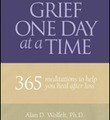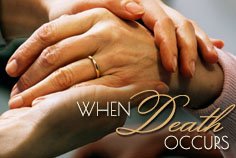Helping Yourself Heal
Allow Yourself to Mourn
Someone you love has died. You are now faced with the difficult, but important, need to mourn. Mourning is the open expression of your thoughts and feelings regarding the death and the person who has died. It is an essential part of healing.
Realize Your Grief is Unique
Your grief is unique. No one will grieve in exactly the same way. Your experience will be influenced by a variety of factors: the relationship you had with the person who died, the circumstances surrounding the death, your emotional support system and your cultural and religious background.
As a result of these factors, you will grieve in your own special way. Don't try to compare your experience with that of other people or to adopt assumptions about just how long your grief should last. Consider taking a "one-day-at-a-time" approach that allows you to grieve at your own pace.
Talk About Your Grief
Expressing your grief openly is called mourning. By sharing your grief outside yourself, healing occurs. Ignoring your grief won't make it go away; talking about it often makes you feel better. Doing so doesn't mean you are losing control, or going "crazy". It is a normal part of your grief journey. Find caring friends and relatives who will listen without judging. Seek out those persons who will "Walk with, not in front of" or "behind" you in your journey through grief. Avoid people who are critical or who try to keep you from grieving. They may tell you, "keep your chin up" or "carry on" or "be happy." While these comments may be well intended, you do not have to accept them. You have a right to mourn; no one has the right to take it away.
Expect to Feel a Multitude of Emotions
Experiencing a loss affects your head, heart and spirit. So you may experience a variety of emotions as part of your grief work. Confusion, disorganization, fear, guilt, relief or explosive emotions are just a few of the emotions you may feel. There is no right or wrong in the timing or feeling of these emotions.
As strange as some of these emotions may seem, they are normal and healthy. Allow yourself to learn from these feelings. Don't be surprised if out of nowhere you suddenly experience surges of grief, even at the most unexpected times. These grief bursts can be frightening and leave you feeling overwhelmed. They are, however, a natural response to the death of someone loved. Find someone who understands your feelings and will allow you to talk about them.
Allow for Numbness
Feeling dazed or numb when someone loved dies is often part of your early grief experience. This numbness serves a valuable purpose: it gives your emotions time to catch up with what your mind has told you. This feeling helps create insulation from the reality of the death until you are more able to tolerate what you don't want to believe.
Be Tolerant of Your Physical and Emotional Limits
Your feelings of loss and sadness will probably leave you fatigued. Your ability to think clearly and make decisions may be impaired. Your low energy level may naturally slow you down. Respect what your body and mind are telling you. Nurture yourself. Get daily rest. Eat balanced meals. Lighten your schedule as much as possible. Caring for yourself doesn't mean feeling sorry for yourself; it means you are using survival skills.
Develop a Support System
Reaching out to others and accepting support is often difficult, particularly when you hurt so much. But the most compassionate self-action you can do during this difficult time is to find a support system of caring friends and relatives who will provide the understanding you need. Find those people who encourage you to be yourself and acknowledge your feelings - both happy and sad.
Make Use of Ritual
On special occasions such as holidays, anniversaries such as wedding dates and the day the person died, and your birthday or the birthday of the person who died, it is natural for your grief to well up inside you and spill over - even long after the death itself. Instead of avoiding these days, you may want to commemorate the life of the person who died by doing something he or she would have appreciated. You might also want to spend these times in the company of people who help you feel safe and cared for.
Embrace Your Spirituality
If faith is part of your life, express it in ways that seem appropriate to you. Allow yourself to be around people who understand and support your religious beliefs. If you are angry with God because of the death of someone you loved, recognize this feeling as a normal part of your grief work. Find someone to talk with who won't be critical of whatever thoughts and feelings you need to explore.
You may hear someone say, "With faith, you don't need to grieve." Don't believe it. Having your personal faith does not insulate you from needing to talk out and explore your thoughts and feelings. To deny your grief is to invite problems that build up inside you. Express your faith, but express your grief as well.
Be Proactive
On special occasions such as holidays, anniversaries such as wedding dates and the day the person died, and your birthday or the birthday of the person who died, it is natural for your grief to well up inside you and spill over - even long after the death itself. Instead of avoiding these days, you may want to commemorate the life of the person who died by doing something he or she would have appreciated. You might also want to spend these times in the company of people who help you feel safe and cared for.
Allow a Search for Meaning
You may find yourself asking, "Why did he die?" "Why this way?" "Why now?" This search for meaning is another normal part of the healing process. Some questions have answers. Some do not. Actually, the healing occurs in the opportunity to pose the questions, not necessarily in answering them. Find a supportive friend who will listen responsively as you search for meaning.
Treasure Your Memories
Memories are one of the best legacies that exist after someone loved dies. Treasure them. Share them with your family and friends. Recognize that your memories may make you laugh or cry. In either case, they are a lasting part of the relationship that you had with a very special person in your life.
Move Toward Your Grief and Heal
The capacity to love requires the necessity to grieve when someone you love dies. You can't heal unless you openly express your grief. Denying your grief will only make it become more confusing and overwhelming. Embrace your grief and heal.
Reconciling your grief will not happen quickly. Remember, grief is a process, not an event. Be patient and tolerant with yourself. Never forget that the death of someone loved changes your life forever. It's not that you won't be happy again. It's simply that you will never be exactly the same as you were before the death.
"The experience of grief is powerful. So, too, is your ability to help yourself heal.
In doing the work of grieving, you are moving toward a renewed sense of meaning and purpose in your life."
Dr. Alan D. Wolfelt
Center for Loss and Life Transition
Grief One Day at a Time
After someone we love dies, each day can be a struggle. But each day, if we work to embrace our normal and necessary grief and care for ourselves, we will also take one step toward healing.
Those who grieve will find comfort and understanding in this daily companion. With one brief entry for every day of the calendar year, this gem by Dr. Wolfelt offers small, one-day-at-a-time doses of guidance and healing. Each entry includes an inspiring quote followed by a short discussion of the day’s theme and a succinct meditation.
 About Dr. Wolfelt
About Dr. Wolfelt
Dr. Alan Wolfelt, is a respected grief counselor, educator, and author. He founded the Center for Loss more than 25 years ago to offer education and support both to grievers and bereavement caregivers. He is known around the world for his compassionate messages of hope and healing as well as his companioning philosophy of grief care. Dr. Wolfelt speaks on grief-related topics, offers trainings for care-givers, and has written many bestselling books and other resources on grief.







 We're Here For You 24/7
We're Here For You 24/7